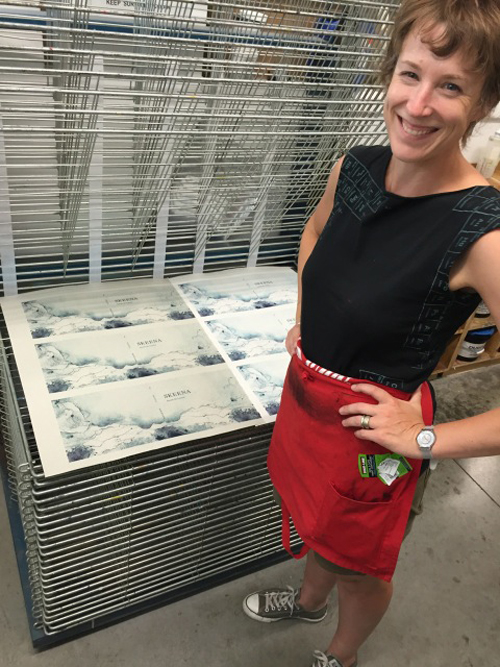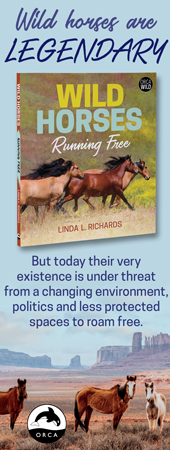#45 Sarah de Leeuw
January 19th, 2016

LOCATION: Ferry Island, Terrace
In the town of Terrace, after the Skeena River narrows under two bridges, it divides at Ferry Island, a little municipal park heavily forested with Cottonwood trees and Devil’s Club. “I have spent more of my life on this specific section of the Skeena River than on any other section,” says Sarah de Leuuq. “It represents both the ordinary nature of a river, and my everyday relationship with it, walking dogs there after work, snowshoeing it in the winter, running along it, going to gravel pit parties as a teenager.”
As the author of a narrative elegy entitled Skeena (2015), de Leeuw is deeply aware of the extraordinary power that the river exerts, how B.C.’s second-longest river floods, freezes, erodes, and even kills – but also always returns new life, year after year. “The section of the Skeena River that the City of Terrace now touches upon,” she says, “is a testament to how, even after thousands of years of human-river interaction, the river is fundamentally still something unto itself, something river-y, full of unshakable riverness.”
ENTRY:
First written about extensively in Hubert Evans’ classic novel Mist on the River (1954), the Skeena River is known to the Tsimshian as ‘Xsan, meaning the “waters that flow from the clouds.” Praised as a North Country epic, and as a poem/assemblage of intelligence and care that “cracks open geology,” and as a “poly-vocal watershed of poetry,” Sarah de Leeuw‘s Skeena (Caitlin 2015) is a single narrative elegy and celebration for and about B.C.’s second-longest river. Sarah de Leeuw and her partner hand-screen printed each dust jacket.
Sarah de Leeuw grew up in Duncan, Haida Gwaii and Terrace, B.C. After de Leeuw earned her BFA from the University of Victoria she spent time teaching English in South Korea. De Leeuw has also worked as a tug boat driver, logging camp cook, a journalist and correspondent for Connections Magazine and as a Research Coordinator for the University of Northern British Columbia task force on the effects of substance abuse on children.
De Leeuw earned her Masters degree from UNBC and she earned her Ph.D in Cultural Geography at Queen’s University in Kingston, Ontario. De Leeuw now works in a faculty of medicine where she teaches and undertakes research on medical humanities and health inequalities. Her creative and academic work has been widely anthologized and appears in journals from CV2 and PRISM International to the Canadian Geographer and Emotion, Space and Society.
Her first literary book, Unmarked: Landscapes Along Highway 16 (NeWest Press, 2004), is a collection of non-fictional reflections on transient life in fishing and logging communities.
Her next project was providing the biographical profiles for the coffee table book, Front Lines: Portraits of Caregivers in Northern British Columbia (Creekstone / Sandhill 2011). Medical and social caregivers must travel great distances, continuously improvising, when they live north of the 54th parallel—from Haida Gwaii to Dawson Creek, near the Alberta border, and from Vanderhoof (the geographical centre of B.C.) to Dease Lake, near the Yukon border. Most of the 44 remarkable people profiled in Front Lines are physicians and nurses; all express positive attitudes about the privilege of helping others in a challenging environment. Both Sarah de Leeuw and photographer Tim Swanky were raised in the North. With dynamic images of people in action, Front Lines celebrates innovation, the cultivation of cooperation and the restoration of pride.
A boldly erotic long poem, Geographies of a Lover (NeWest 2011) draws inspiration from such works as Pauline Réage’s The Story of O and Marian Engel’s Bear. According to publicity materials, “Sarah de Leeuw uses the varied landscape of Canada—from the forests of North Vancouver through the Rocky Mountains, the prairies, and all the way to the Maritimes—to map the highs and lows of an explicit and raw sexual journey, from earliest infatuation to insatiable obsession and beyond.”
Sarah de Leeuw received the Dorothy Livesay Poetry Prize in 2013 for Geographies of a Lover. She has been a two-time recipient of a CBC Literary Award for creative non-fiction; and she won a Western Magazine Gold Award for the best article published in 2014 in British Columbia.
As of 2015, Sarah de Leeuw was dividing her time between Prince George and Kelowna.
Review of the author’s work by BC Studies:
Front Lines: Portraits of Caregivers in Northern British Columbia
Unmarked: Landscapes Along Highway 16
BOOKS:
Unmarked: Landscapes Along Highway 16 (NeWest Press, 2004)
Front Lines: Portraits of Caregivers in Northern British Columbia (Creekstone / Sandhill 2011) 978-0-9783195-4-0 $32
Geographies of a Lover (NeWest Press 2011)
Skeena (Caitlin 2015) $18 978-1-927575-91-8
[BCBW 2015]
Review of the author’s work by BC Studies:
Landscape Along Highway 16
A small book about a big place, Unmarked: Landscapes Along Highway 16 by Sarah de Leeuw (NeWest Press $15.95) reflects on large lives in Tlell, Port Clements, Kitwanga, Rosswood, Fraser Lake and places that many people have never heard of. De Leeuw’s poetic essays capture stories from up country communities dotted along grand river valleys, below towering mountains and across a turbulent sea—various places de Leeuw has called home.
“No one believes the tales I have to tell,” she says, “the tales of balancing rocks and whales spitting on highways, of road fissures so deep that a constant stream of cement cannot fill them, tiny earthquakes always re-opening the pavement. Drink from the water near this fracture and your blood will be charged like a magnet; you will always return, a compass needle veering toward the magnetic north.”
De Leeuw has worked in a women’s centre and a logging camp; as a tug boat driver and a journalist. She is now completing her Ph.D in Cultural Geography at Queen’s University in Kingston. She describes her first book as a collection of essays about powerful people whose stories “are relegated to the land of nowhereness.” 1-896300-88-X — Heather Ramsay, BCBW 2004.
[INFORMATION POSTED JANUARY 19, 2016]



Leave a Reply